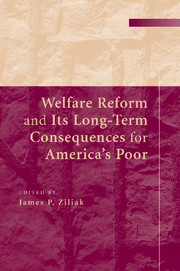Book contents
- Frontmatter
- Contents
- Contributors
- Preface
- Introduction
- 1 What We Know, What We Don't Know, and What We Need to Know about Welfare Reform
- 2 Welfare Reform and the Level and Composition of Income
- 3 How Have Expansions in the Earned Income Tax Credit Affected Family Expenditures?
- 4 How Families Are Doing Nine Years after Welfare Reform: 2005 Evidence from the Three-City Study
- 5 The Impact of Welfare Reform on Leaver Characteristics, Employment, and Recidivism
- 6 A Reexamination of the Impact of Welfare Reform on Health Insurance Among Less-Skilled Women
- 7 How Welfare Policies Affect Child and Adolescent School Performance: Investigating Pathways of Influence with Experimental Data
- 8 The Effects of Welfare and Child Support Policies on the Incidence of Marriage Following a Nonmarital Birth
- 9 Welfare Reform and Health among the Children of Immigrants
- 10 Mismatches and Unmet Need: Access to Social Services in Urban and Rural America
- Index
7 - How Welfare Policies Affect Child and Adolescent School Performance: Investigating Pathways of Influence with Experimental Data
Published online by Cambridge University Press: 21 January 2010
- Frontmatter
- Contents
- Contributors
- Preface
- Introduction
- 1 What We Know, What We Don't Know, and What We Need to Know about Welfare Reform
- 2 Welfare Reform and the Level and Composition of Income
- 3 How Have Expansions in the Earned Income Tax Credit Affected Family Expenditures?
- 4 How Families Are Doing Nine Years after Welfare Reform: 2005 Evidence from the Three-City Study
- 5 The Impact of Welfare Reform on Leaver Characteristics, Employment, and Recidivism
- 6 A Reexamination of the Impact of Welfare Reform on Health Insurance Among Less-Skilled Women
- 7 How Welfare Policies Affect Child and Adolescent School Performance: Investigating Pathways of Influence with Experimental Data
- 8 The Effects of Welfare and Child Support Policies on the Incidence of Marriage Following a Nonmarital Birth
- 9 Welfare Reform and Health among the Children of Immigrants
- 10 Mismatches and Unmet Need: Access to Social Services in Urban and Rural America
- Index
Summary
Introduction
Over the past 30 years, public programs for poor families have moved away from cash assistance to a focus on promoting parents' self-sufficiency through employment. Improving the well-being of children is an often expressed policy goal, but the bulk of the rhetoric and the evidence driving policy debates has centered on adult employment and reductions in the welfare rolls. Both experiments and welfare-leaver studies show that many families remain in poverty even when parents are employed full time. This has resulted in a shift in policy conversation from caseload reduction to concerns about reducing poverty and improving children's well-being in low-income families with working parents.
This chapter summarizes the results of research conducted as part of the Next Generation Project, a collaborative project involving researchers at MDRC and several universities, using evidence from a diverse set of experiments to understand some of the conditions under which policyinduced increases in employment among low-income single parents can help or hurt children. Unique to this research is the synthesis of results from several random assignment experiments launched in the late 1980s and early 1990s to learn how policies designed to increase employment and reduce welfare receipt among low-income parents can affect the development of their children. This chapter goes beyond simply examining program impacts. We bring an interdisciplinary perspective to formulating and testing hypotheses about the ways in which changes in family functioning caused by the experimental programs facilitate or harm children's development.
- Type
- Chapter
- Information
- Welfare Reform and its Long-Term Consequences for America's Poor , pp. 255 - 289Publisher: Cambridge University PressPrint publication year: 2009
- 16
- Cited by

